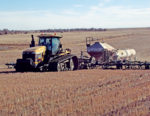Advertise Follow Us
Articles Tagged with ''nutrient''
No-Till Turns Out Top Yields While Slashing Costs
Feeding crops the right amount of nutrients at the best possible time pays big dividends while protecting the environment for this Virginia family.
Read More
Finding The Right Fit With Fertility
To be more efficient with fertilizer, strip-tillers must be use caution in cutting rates and put nutrients where they do more good than harm.
Read More







